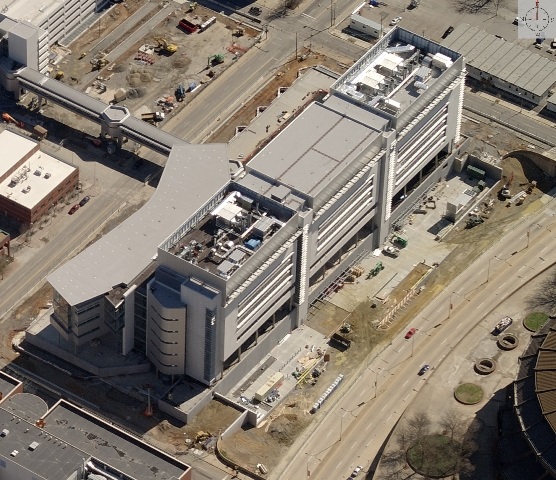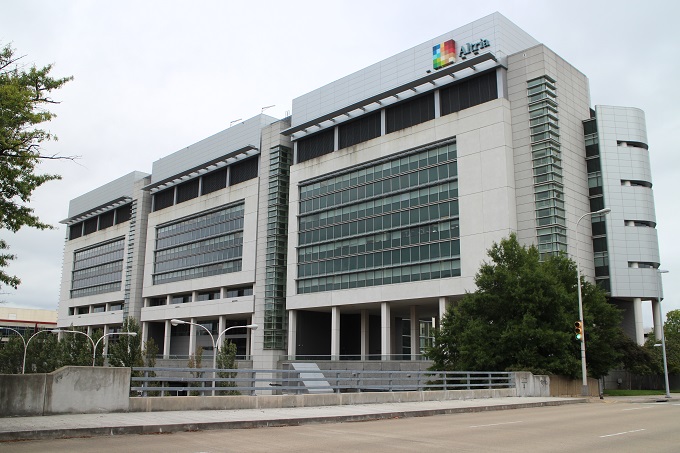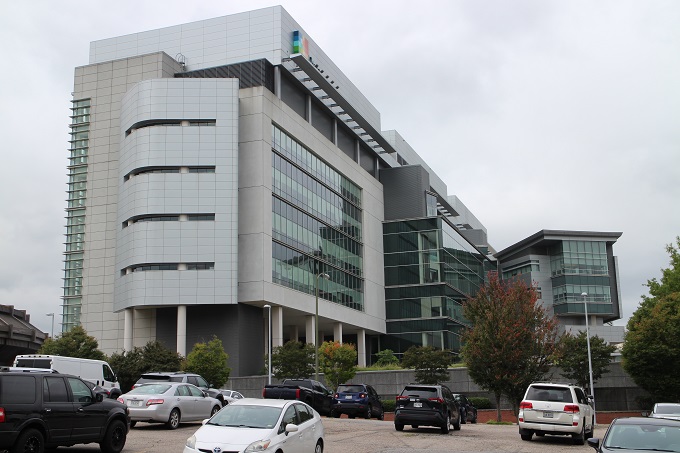As the City of Richmond and VCU Health System remain at odds over tax payments tied to a failed downtown development project, Virginia Commonwealth University is looking to acquire a nearby building to expand its academic medical center campus.
VCU is in talks with state legislators about purchasing the Altria Center for Research and Technology building at 600 E. Leigh St.
The university and state officials have approached Altria about a potential sale and are in early discussions with the tobacco giant, a company spokesperson confirmed Wednesday.
“Though the building was not listed for sale, Altria agreed to discuss a potential sale when approached by VCU and the Commonwealth of Virginia,” Altria spokesman David Sutton said in an email.
Should a sale go forward, Sutton said Altria plans to construct a new research facility elsewhere in the city, likely at the Philip Morris USA Manufacturing Center complex along Commerce Road and Interstate 95 in South Richmond.
A deal could also cause the property to become tax-exempt, as real estate owned by VCU or VCU Health typically is not subject to local taxes.
Purchasing the nine-story, 450,000-square-foot Leigh Street building would allow VCU to expand its academic medical center campus, which includes space leased in the adjacent Bio+Tech 8 building across Jackson Street.
VCU plans to use the Altria building to house some of its academic health sciences programs, research functions for Massey Comprehensive Cancer Center, and the university’s Medicines for All Institute, among other potential uses.
Relocating health sciences programs such as the School of Pharmacy and the School of Public Health to the building would free up space for the health system to add more fully private rooms to VCU Medical Center, said Grant Heston, a spokesman for VCU and VCU Health.
“The building holds tremendous potential to accelerate VCU’s nationally recognized research programs that improve the health and wellbeing of Virginians,” Heston said in an email. “Additional research space is a priority for VCU, Richmond and the Commonwealth and is crucial to delivering new drugs, medical devices, pharmaceutical advancements and breakthroughs in disease prevention and treatments.”
Heston said construction of a new research facility of the Altria building’s size would likely cost more than $700 million and take 10 to 12 years.
20-year-old building
Philip Morris USA, a subsidiary of Henrico-based Altria, owns the building and adjacent nine-level parking deck across Jackson Street, which connects to the building via a pedestrian bridge. It built the building in 2004 for $266 million, according to a city development agreement that provided $1.25 million in annual economic development grants for 10 years.
Constructed by Hourigan, the complex includes the nine-story building, 350,000-square-foot parking deck, 25,000-square-foot central utilities building and the pedestrian bridge. The complex consists of research labs, a kitchen and dining areas, work areas, a fitness center, offices and support areas, according to Hourigan’s website.
The 4.3-acre main building property is assessed by the city at nearly $275 million, while the 3-acre parking deck parcel is assessed at over $28 million, for a total combined assessment of $303 million. The city previously owned the 600 E. Leigh St. parcel.
The building comprises the Bio+Tech 9 portion of the 34-acre VA Bio+Tech Park operated by Activation Capital, which has been planning its Virginia Innovation Center building at 706 E. Leigh St., next door to the Altria building.
The Massey Comprehensive Cancer Center had been identified as a potential anchor tenant for that Activation project. But without a commitment from VCU, Activation Capital is now considering scaling down the project.
Purchase could take building off city tax rolls

The nine-story building looms beside the below-grade stretch of Leigh Street, across from the Coliseum. A pedestrian bridge across Jackson Street connects it to a parking deck. (City property record image)
If purchased by VCU, the property could become tax-exempt like most other real estate owned by the university and the health system.
Lincoln Saunders, Richmond’s chief administrative officer, said such a sale would wipe out more than $3 million in annual real estate tax revenue that the city receives from the Altria property. He said the property is the city’s second-largest tax-generating property, after the Dominion Energy tower on Canal Street.
Saunders, who has been butting heads with VCU Health over owed real estate tax payments stemming from the failed redevelopment of Richmond’s nearby former Public Safety Building site, said the loss of the Altria property from the city’s tax rolls and the roughly $2 million Public Safety tax payment that VCU has not paid for this year would equate to about a penny and a half of the city’s real estate tax rate.
The annual payments for the Public Safety site were included in VCU Health’s agreement with Richmond and the developer for that project to ensure the city would receive real estate tax revenue from the property. The deal was arranged so that VCU Health would be the master tenant in a privately developed building, as opposed to VCU owning a building that would then be tax-exempt.
Saunders said the city was notified by Altria that VCU had approached it about purchasing the research building and had started conversations with the House and Senate money committees, which would need to approve any purchase agreement.
Heston, the VCU spokesman, said conversations with Altria are ongoing and no timetable has been set for a final decision. Heston did not respond to a question about whether VCU would keep the property revenue-generating for the city.
“VCU is pursuing multiple financial and physical analyses of the building; any agreement will be subject to review and approval by the Board of Visitors, and ultimately the Governor’s office and Virginia General Assembly,” Heston said.
The General Assembly in its latest budget directed VCU Health to find a way to terminate its payments to the city for the Public Safety site, which the health system had once eyed for its planned Dentistry Center project. It is now planning that project at its nearby Larrick Student Center property.
As the City of Richmond and VCU Health System remain at odds over tax payments tied to a failed downtown development project, Virginia Commonwealth University is looking to acquire a nearby building to expand its academic medical center campus.
VCU is in talks with state legislators about purchasing the Altria Center for Research and Technology building at 600 E. Leigh St.
The university and state officials have approached Altria about a potential sale and are in early discussions with the tobacco giant, a company spokesperson confirmed Wednesday.
“Though the building was not listed for sale, Altria agreed to discuss a potential sale when approached by VCU and the Commonwealth of Virginia,” Altria spokesman David Sutton said in an email.
Should a sale go forward, Sutton said Altria plans to construct a new research facility elsewhere in the city, likely at the Philip Morris USA Manufacturing Center complex along Commerce Road and Interstate 95 in South Richmond.
A deal could also cause the property to become tax-exempt, as real estate owned by VCU or VCU Health typically is not subject to local taxes.
Purchasing the nine-story, 450,000-square-foot Leigh Street building would allow VCU to expand its academic medical center campus, which includes space leased in the adjacent Bio+Tech 8 building across Jackson Street.
VCU plans to use the Altria building to house some of its academic health sciences programs, research functions for Massey Comprehensive Cancer Center, and the university’s Medicines for All Institute, among other potential uses.
Relocating health sciences programs such as the School of Pharmacy and the School of Public Health to the building would free up space for the health system to add more fully private rooms to VCU Medical Center, said Grant Heston, a spokesman for VCU and VCU Health.
“The building holds tremendous potential to accelerate VCU’s nationally recognized research programs that improve the health and wellbeing of Virginians,” Heston said in an email. “Additional research space is a priority for VCU, Richmond and the Commonwealth and is crucial to delivering new drugs, medical devices, pharmaceutical advancements and breakthroughs in disease prevention and treatments.”
Heston said construction of a new research facility of the Altria building’s size would likely cost more than $700 million and take 10 to 12 years.
20-year-old building
Philip Morris USA, a subsidiary of Henrico-based Altria, owns the building and adjacent nine-level parking deck across Jackson Street, which connects to the building via a pedestrian bridge. It built the building in 2004 for $266 million, according to a city development agreement that provided $1.25 million in annual economic development grants for 10 years.
Constructed by Hourigan, the complex includes the nine-story building, 350,000-square-foot parking deck, 25,000-square-foot central utilities building and the pedestrian bridge. The complex consists of research labs, a kitchen and dining areas, work areas, a fitness center, offices and support areas, according to Hourigan’s website.
The 4.3-acre main building property is assessed by the city at nearly $275 million, while the 3-acre parking deck parcel is assessed at over $28 million, for a total combined assessment of $303 million. The city previously owned the 600 E. Leigh St. parcel.
The building comprises the Bio+Tech 9 portion of the 34-acre VA Bio+Tech Park operated by Activation Capital, which has been planning its Virginia Innovation Center building at 706 E. Leigh St., next door to the Altria building.
The Massey Comprehensive Cancer Center had been identified as a potential anchor tenant for that Activation project. But without a commitment from VCU, Activation Capital is now considering scaling down the project.
Purchase could take building off city tax rolls

The nine-story building looms beside the below-grade stretch of Leigh Street, across from the Coliseum. A pedestrian bridge across Jackson Street connects it to a parking deck. (City property record image)
If purchased by VCU, the property could become tax-exempt like most other real estate owned by the university and the health system.
Lincoln Saunders, Richmond’s chief administrative officer, said such a sale would wipe out more than $3 million in annual real estate tax revenue that the city receives from the Altria property. He said the property is the city’s second-largest tax-generating property, after the Dominion Energy tower on Canal Street.
Saunders, who has been butting heads with VCU Health over owed real estate tax payments stemming from the failed redevelopment of Richmond’s nearby former Public Safety Building site, said the loss of the Altria property from the city’s tax rolls and the roughly $2 million Public Safety tax payment that VCU has not paid for this year would equate to about a penny and a half of the city’s real estate tax rate.
The annual payments for the Public Safety site were included in VCU Health’s agreement with Richmond and the developer for that project to ensure the city would receive real estate tax revenue from the property. The deal was arranged so that VCU Health would be the master tenant in a privately developed building, as opposed to VCU owning a building that would then be tax-exempt.
Saunders said the city was notified by Altria that VCU had approached it about purchasing the research building and had started conversations with the House and Senate money committees, which would need to approve any purchase agreement.
Heston, the VCU spokesman, said conversations with Altria are ongoing and no timetable has been set for a final decision. Heston did not respond to a question about whether VCU would keep the property revenue-generating for the city.
“VCU is pursuing multiple financial and physical analyses of the building; any agreement will be subject to review and approval by the Board of Visitors, and ultimately the Governor’s office and Virginia General Assembly,” Heston said.
The General Assembly in its latest budget directed VCU Health to find a way to terminate its payments to the city for the Public Safety site, which the health system had once eyed for its planned Dentistry Center project. It is now planning that project at its nearby Larrick Student Center property.





This university should be prohibited from real estate “deals” until an investigation is completed and people at the top are removed.
Perhaps they should concentrate on making university more affordable over the current scheme of providing an out for entities holding old and unwanted property.
WOW, look at you with all those upvotes!!
Yes, there should be the investigation AND we the market for education at least should not keep allowing itself to be ripped off by the Education-Industrial Complex.
Why would Altria want to spend $700 million for a new research facility when it already has one ? Remodeling the existing property would appear to be more cost effective,
Depends on how much the physical needs of such a facility have changed. I have no knowledge of it but I could imagine a situation where that could be the case. I do hope instead of all the way down at the facility they put the new building somewhere like Manchester to continue building off of the momentum there.
Also possible that Altria needs much less space and could build something that might be on a smaller scale to accommodate current needs.
More property off of the tax rolls…in an area that needs private investment.
Interesting how this news breaks just as the city council is also discussing a potential rate cut.
Timing couldn’t be more timely for those who want to keep the tax rate at its absurdly high-level.
More real estate off the tax rolls and the taxpayer picks up the burden!
Shameful. What VCU gives back to the local community as a nonprofit is nowhere near the tremendous amount they take away.
Not true.
Universities attract people and businesses that create jobs.
This is becoming a serious problem. It’s going to be the year 2050 and we’ll be living in VCU, Virginia
No it will still say Richmond just sponsored by VCU…
Certainly more apt — before VCU became more than a glorified community college, Richmond was mostly sub-par.
Please. The Richmond metro grows faster than VCU.
Please stop using the tens of thousands of dollars I threw at a mediocre education for your land grabs. Maybe pay your employees and professors a living wage instead.
Signed,
VCU Alum
Sorry for your loss.
That building is a monster in size.
Best part: Stoney would not be able to screw up the whole thing.